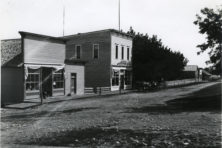Lake Wobegon Comes to Fish Creek: A conversation with Garrison Keillor
- Share
- Tweet
- Pin
- Share

“Well, it’s been a quiet week in Lake Wobegon, Minnesota, my hometown, out there on the edge of the prairie.” From my college days on, the opening line about the latest news in the beloved, fictional town was synonymous with Saturday evenings.
Having lived in Minnesota for the first two years of my life and then returning to attend college, A Prairie Home Companion – hosted by writer, humorist and radio personality Garrison Keillor – became my young-adult equivalent of the Saturday-morning cartoons I once looked forward to as a child. Listening to the program was as much a part of my husband’s and my weekend routine as going to the gym or our never-ending list of weekend-warrior home projects.
Though Garrison Keillor retired from the radio show in 2016, he’s touring again. Some stops along the route reprise the iconic radio show, but other performances – including the July 30 engagement at Door Community Auditorium – present Keillor & Company: an evening of stand-up comedy, storytelling, music and poetry starring Keillor and featuring pianist Dan Chouinard and vocalist Prudence Johnson.
In advance of the show, I spoke with Keillor by phone about the tour, how he approaches writing for the stage versus the page, and why getting older is the best exercise for learning to live in the moment. This interview has been edited for space and clarity.
Sara Lancaster (SL): Thank you for taking the time out of a busy tour schedule to talk with me. Thinking back to some of your past shows I’ve attended, one thing that always struck me was the varying age demographics of the audience, from people around my parents’ and grandparents’ ages, as well as people closer to my husband’s and my age, and even families that took their kids in their tweens and teenage years. How do you maintain the interest of such a wide range of ages?
Garrison Keillor (GK): I think you do that by telling stories. You can do a certain amount of stand-up comedy, but stand-up comedy tends to be rather age specific and generational. The things that make people in their 70s laugh are not going to affect people in their 20s. But a story, in which there is a beginning and a middle and an end – and maybe some surprises and also comedy – is a way you can appeal to a very broad group of people.
SL: While we’re on the topic of age, the online description of your upcoming show at Door Community Auditorium mentions that the evening is tied together by the theme “the beauty in growing old.” What inspired that theme, and what do you hope audiences of all ages take away from it?
GK: Well, it’s just my own feeling. I turn 80 in one month, and 80 is an age I used to dread when I was your age and long after. But you come up to it, and you realize, first, you have to be lucky. You have to have chosen the right parents and the right genetics. But there’s a great beauty in coming to an age where your ambition, your big ideas for the future, have dissipated.
I mean, what’s your ambition when you’re 80? Everything is about today. It all comes down to today, maybe tomorrow, maybe the next day. Life becomes very small, which it has for many people during the pandemic. Many people are depressed by this. I happen not to be. I’m a writer. I have a lot of unfinished projects I am working on, so every morning I get up and I go to work.
SL: Speaking of writing, you write for the page by writing books, but you also write for the stage with performing and live storytelling. How do you adjust your craft based on the audience you’re writing for?
GK: Well, you write for performance. You’re writing in a narrative style that has to hold the audience. You have to be aware that the audience’s patience is limited, and you can easily lose their concentration. So you’re writing in a more dramatic style, where when writing for print, people can go along with you for a while. You can create a bit of a puzzle on the page that people will enjoy dealing with. You can be a little more mysterious than if you’re writing for performance.
SL: Do you prefer writing for one over the other?
GK: I like writing for the page because I grew up hanging out in libraries when I was a little kid, and so books are always sort of supreme in my mind. I never intended to be a performer, to be a comedian, but it’s something you can learn to do.
Writing books is what I’m primarily interested in because, to me, a book is your message to the future. You have hopes that a book will last for a long time after you’re gone. You may not be right about that, but you won’t know that you’re wrong.
SL: So what are you writing these days?
GK: I’ve been working on a little memoir. I wrote a full memoir a year and a half ago called That Time of Year. I’m writing another one, taking the advantage of being at this point in life, and being able to look back at life and have some pieces of it that are terribly clear.
Others, whole years, are just a blur [because] there was so much going on, and you can’t remember. But certain little episodes are beautifully clear, and you realize something happened that day in which your life, ever so slightly, changed course.
SL: Are you someone who keeps a diary or journal with notes of things that happened on a day-to-day basis so that you can remember those moments and go back to them for writing inspiration?
GK: I’ve never kept a journal. I never did ever. I don’t know why. I think it takes a greater sense of self-importance than any Minnesotan would have. We’re brought up to be self-effacing.
SL: Where do you find your inspiration for the characters and stories you write about?
GK: I draw them from talking to my relatives – and I hope my relatives don’t find out how much I draw from talking to them.
SL: What advice do you have not only for writers, but creatives in general?
GK: I think that it’s always good to be in contact, in some group of people doing similar things. Whether or not you show your work to others or not is entirely up to you. Some people absolutely never do. I do, and often, show my work to other writers and hope to get an honest take on it.
But it’s good to know people who are somehow alive with you and feel that there is some commonality of purpose. In writing, and maybe in other creative enterprises, too, you’re doing it for yourself. You are the one who needs to be pleased before you can offer it to others. It’s a lonely line of work, and loneliness is a difficult road. You really need to have friends [because] I really believe that friendship is what it’s all about, what it’s always been about.
Tickets to the July 30 performance of Keillor & Company – including the latest news from Lake Wobegon, stand-up comedy, storytelling, poetry and audience singing – are available for $48, $65 and $75 at dcauditorium.org.




